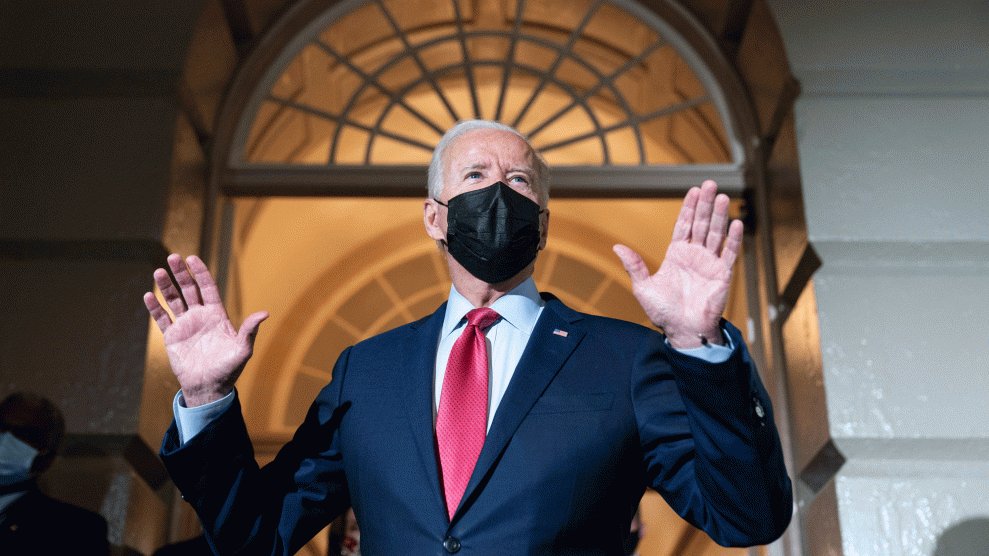
President Joe Biden speaks with reporters after meeting with House Democrats on Capitol Hill in October.Alex Brandon/AP
Editor’s note: This must-read essay from David Corn first appeared in his new newsletter, This Land. Given the ongoing efforts by Donald Trump and his followers to undermine American democracy and David’s spot-on analysis, we wanted to make sure as many readers as possible have a chance to see it. This Land is a newsletter written by David twice a week that provides behind-the-scenes stories about politics and media; his unvarnished take on the events of the day; film, books, television, and music recommendations; interactive audience features; and more. Subscribing costs just $5 a month—but right now you can sign up for a free 30-day trial of This Land here.
President Joe Biden, I fear, may be screwing up. Not with the infrastructure bills. The current deliberations do look messy, but there’s still plenty of time to concoct a compromise that expands education, health care, and other important social welfare programs and includes climate change action. Biden, though, might be miscalculating on another critical front: saving democracy.
As I and others have noted, the nation is undergoing a crisis, with Donald Trump and his Republican comrades attempting to undermine democratic structures and norms to rig the system in their favor. For years, Republicans have tried to implement voter suppression schemes and have relied on gerrymandering (as Democrats often do) to gain a political advantage that would allow their minority party to exert majority control. They’ve been striving to create a political apartheid. And Trump and his devotees have supercharged this GOP effort with the Big Lie offensive and the seditious attack on the US Capitol, aiming to subvert democratic procedures to accommodate authoritarianism. Trump’s never-ending assault on US elections—claiming they are fraudulent unless they produce the results he seeks—is poisoning the political culture. He wants his followers to believe democracy doesn’t work, for then he (or others) can justify resorting to other means to grab and retain power.
And there’s a Plan B: If you can’t delegitimize the system, take it over. Trump loyalists—including QAnoners and other extremists—are signing up as precinct volunteers who can help pick poll workers and members of boards that oversee elections. That is, they are burrowing into the election system at the ground level. This is a scheme championed by Steve Bannon, the Trump adviser whom Trump pardoned. (Last week, Bannon, after speaking to a GOP social club about preparing for the next Republican administration, told a reporter, “If you’re going to take over the administrative state and deconstruct it, then you have to have shock troops prepared to take it over immediately.”) A number of pro-Trump election denialists are now attempting to win secretary of state races; this will permit them to control the election apparatus in swing states. Meanwhile, Trumpsters promoting his election fraud disinformation are still pushing for sham audits in Pennsylvania, Idaho, and elsewhere. And so far legislatures in 16 states have passed measures to shift election authorities from governors and secretaries of state to the legislatures, increasing the possibility of partisan wrangling over vote tallies.
It’s a war on democracy. Trump has recruited the national Republican Party, local state officials, and a wide assortment of extremists for this battle.
After the election, Trump conspired with a handful of henchmen to try to overturn the election. He pressured officials at the Justice Department to declare the results corrupt. He leaned on state officials, especially in Georgia. He recruited a conservative constitutional lawyer, John Eastman, who drafted a memo contending that Vice President Mike Pence could nullify Biden’s electoral vote victory. It was essentially a blueprint for a coup. (Pence didn’t agree with Eastman’s argument.) Trump incited a riot that had the potential to thwart Congress’ certification of Biden’s win. He failed in these rearguard—and largely behind-the-scenes—actions, though he and his lieutenants came within inches of triggering an all-out constitutional crisis.
Now Trump’s assault on the political system is out in the open. He denigrates the electoral system, and he has succeeded in convincing tens of millions of Americans that it cannot be trusted. A CNN poll last month found that 78 percent of Republicans believe Biden did not win, and 54 percent said there is solid evidence of that. (There is not.) Moreover, Trump’s continuing status as the leader of the Republican Party—and as its top contender for the 2024 presidential nomination—signals that the encouragement of violence to achieve a political end is widely excused, if not outright accepted, within GOP ranks. Only 56 percent of Republicans say it is “very important” to find and prosecute 1/6 rioters—a drop of 13 points since March—and 57 percent note there has been too much attention paid to the attack.
This is a dangerous moment for the nation. As news coverage obsesses on the immediate—the tussle over the infrastructure bills on Capitol Hill, the rise in undocumented immigrants at the border, the debt ceiling dustup, the collapse of police reform negotiations, and so on—the media generally have failed to cover Trump’s not-too-secret effort to break American democracy in a comprehensive fashion. The bogus audits draw attention, as do Trump’s ceaseless and baseless claims of election fraud. But there is no overarching narrative focused on Trump’s ongoing threat to democracy. This war in plain sight is not widely recognized.
Two weeks ago, Robert Kagan, a neoconservative who was a prominent cheerleader for the disastrous Iraq invasion, published a much-discussed piece in the Washington Post declaring what some of us have previously pointed out: “Our constitutional crisis is already here.” Kagan opened by starkly observing, “The United States is heading into its greatest political and constitutional crisis since the Civil War, with a reasonable chance over the next three to four years of incidents of mass violence, a breakdown of federal authority, and the division of the country into warring red and blue enclaves.” Trump, he correctly noted, is driving this conflict. The former guy and his Republican allies, Kagan wrote, “are actively preparing to ensure his victory [in 2024] by whatever means necessary.” He warned that “the stage is being set for chaos” and “[m]ost Americans and all but a handful of politicians—have refused to take this possibility seriously enough to try to prevent it.”
That may well include Biden. The president in July did deliver a passionate speech defending voting rights and derided Republican voter suppression and election subversion efforts. He asked the GOP, “Have you no shame?” And he called passing legislation to protect and expand voting rights a “national imperative.” But that was months ago, and Biden has not yet wholly engaged in this fight to preserve democracy. He has not told the people the full story: Trump is imperiling the foundation of the American political system. He has not brought attention to the menace at hand.
Only Biden has the standing—the megaphone—to fully sound the alarm and convey this distressing narrative to a wide audience of Americans. He needs to connect the dots for the public, to clearly identify the various interlocking aspects of this struggle, and to call out Trump and the Republicans for more than their obvious voter suppression bills—to name what they are doing as a treacherous assault upon the republic.
There are certainly reasons why Biden might not want to leap into all-out combat against Trump and the GOP at this moment. As a candidate, he vowed to pursue compromise with the other side and to attempt to repair the partisan wounds of the country. Blasting Republicans as a clear and present danger to the United States would not be in sync with that theme. And Biden is hoping to preserve some degree of Republican support for at least one of his infrastructure measures. Perhaps he figures there will be time to ring this bell after he pockets a few more legislative victories and before the next election.
Yet Trump and his cultists have already gained ground in this fight, as Kagan detailed. Should Biden wait much longer, it could become too late. The Republicans are further ahead in their campaign to rig the system than the Democrats are in blocking them. Texas Republicans, for instance, are well into their latest gerrymandering spree to diminish the voting power of communities of color. Enacting measures that bring much-needed programs to the public is vital for Biden and the Democrats. Before the midterm elections next year, they must demonstrate to voters they can deliver. But there is nothing more in the self-interest of Democrats than to thwart the Republican crusade to manipulate electoral machinery for their benefit.
Without a functioning democracy, it will be impossible to do much about the pressing matters the nation faces: climate change, income inequality, racial justice, future pandemics, and much more. The top priority of the president referenced in the presidential oath of office is to preserve, protect, and defend the Constitution. That is his chief obligation. Biden certainly takes this charge seriously. But the 46th president has yet to publicly reveal he realizes the scope of the all-out political warfare underway and that the fate of the United States depends upon the outcome.
















